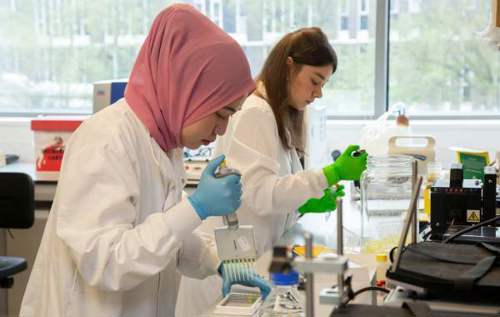Targeted treatment for rheumatoid arthritis: Could the bacteria in our digestive system hold the key?
02 April 2024
If you’ve been diagnosed with rheumatoid arthritis, your doctor might suggest you try a disease-modifying anti-rheumatic drug (or DMARD).
DMARDs are medicines like methotrexate and sulfasalazine. They work by easing your symptoms and slowing down the progression of rheumatoid arthritis.
It can take a bit of trial-and-error to find which DMARD works for you – and we know it can be really frustrating.
But imagine if we could predict how someone would respond to a DMARD?
If this was possible, we wouldn’t have to wait weeks to see if the treatment wasn’t working. Your healthcare team could tailor your treatment, right from the very start.
That’s exactly what our researchers at King’s College London hope to uncover – and they think that the answer might lie in our gut bacteria.
Could understanding the bacteria in our microbiome help us tailor rheumatoid arthritis treatment?
Our researchers found that having a lot of a certain type of bacteria in your saliva may suggest whether you’ll respond well to DMARDs.
With this incredible discovery, we might able to develop a tool that could help healthcare professionals tailor treatments in the future.
What is the microbiome?
In our bodies, there is a bustling community of tiny living things, which are sometimes called the microbiome. These include bacteria, viruses and fungi.
These bacteria are crucial to our wellbeing. They help us digest our food, but they also play another vital role: they help balance our immune system.
This is part of the body’s natural defence system that helps protect you against infection, disease, and bacteria.
Right now, a lot of research hopes to uncover how the bacteria in our guts and saliva might influence the development of rheumatoid arthritis.
Why is this research important?
 We know that if you’re treated with DMARDs early, you’re more likely to have a positive outcome.
We know that if you’re treated with DMARDs early, you’re more likely to have a positive outcome.
But, nowadays, there’s often a ‘trial-and-error' approach to treatment. This means you might have to try several DMARDs, before you find the one that works for you.
Being able to predict who might respond to a DMARD would help us stop this cycle.
It could help us inch closer to a more personalised approach to treatment. So that people get the care they need sooner in the course of their illness, reducing the impact of rheumatoid on long term health.
What did the researchers want to find out?
The researchers wanted to uncover whether the types and amount of bacteria in our gut and saliva could help us predict who may respond to DMARDs.
They also wanted to look at the differences in the microbiome of people that had just started taking DMARDs.
What did the researchers do?
The researchers looked at the microbiome of 144 people who were newly diagnosed with rheumatoid arthritis and hadn’t been prescribed DMARDs yet.
The researchers collected stool and saliva samples from people living with rheumatoid arthritis:
- at the start of the experiment.
- 6 weeks after people started taking DMARDS.
- 12 weeks after people started taking DMARDS.
The researchers also measured their levels of inflammation and disease activity.
The researchers wanted to know how the bacteria in our gut and saliva change after people start taking DMARDs.
What did the researchers discover?
Our researchers found that your microbiome before treatment may suggest whether you'll respond to DMARD treatment.
People who responded well to DMARDs had different patterns of microbes in the gut compared to those who didn’t respond, after 6 and 12 weeks of treatment.
Our researchers think this may be because DMARDS help to rebalance the microbes in our gut.
They also compared these findings with people who had been using DMARDS for a long time. They found that there was a decrease in several other types of bacteria.
Learn more about our research achievements
How will this research help people living with arthritis?
This research adds to the growing evidence that the make-up of our microbiome is hugely important to the development and treatment of rheumatoid arthritis.
The suggestion that DMARDs might restore balance to our microbiome is also interesting. In the future, this could lead to the development of new treatments that target your microbiome.
Being able to predict treatment responses by simply using a stool sample or a salvia sample is also a groundbreaking idea. In years to come, this could lead to more targeted approaches to treatment.